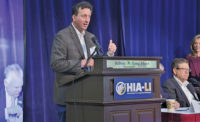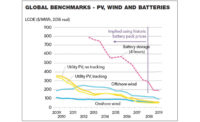Expert Flint Witness Testimony Draws Fire

H2M CEO Richard Humann said engineers violated the standard of care.
Photo credit: H2M Architects & Engineers
The ethics and standard-of-care witness in the negligence trial of two engineering firms connected to the 2015 Flint, Mich., water crisis said in three days of testimony that both firms failed to act to stop or limit the public danger despite having the knowledge and obligation to alert higher government authorities. The witness, Richard Humann, CEO of H2M Architects & Engineers, said that when clients endanger the public a reasonable engineer must clearly advise the client of the danger and “further advise some regulating authority.” And that didn’t happen in Flint, he said.
“You need to bring attention” to the danger even if the client ignores proper steps outlined in an engineer’s report, Humann told the 10-member jury in federal court in Ann Arbor, Mich.
After Humann explained his opinion, attorneys for defendant firms seemed to put him on trial during cross-examination, pointing out gaps in the limited research he made to reach his conclusions and making sure jurors learned of his $500-an-hour rate of pay.
The testimony came at a crucial phase of the four plaintiffs’ Flint children’s lawsuit over the unsafe lead levels in the city’s water supply in 2014 and 2015, when a switch in the water source and restart of Flint’s treatment plant made to save money failed to include needed anti-corrosion chemicals in the feed. Humann had two weeks earlier sought to avoid testifying in court because one of the two defendants, Veolia, had acquired another French water services giant, Suez, that has a contract with Humann’s company, H2M. He said it created a conflict. How the matter was resolved isn’t known.
Attorneys for both Veolia and the other defendant engineer, Lockwood Andrews & Newnam, went on the attack. They zeroed in on the limited research they said Humann performed in preparing his report to the plaintiffs, which included a state task force investigation of the crisis and reports issued by the engineers. The defense attorneys ticked off names of people involved in the Flint crisis with whom Humann was unfamiliar and various emails and depositions that he did not consult. They noted that Humann did not know what percent of Flint households had lead service lines and that although he had previously been an expert witness in water cases, he had never been one in a case involving lead. Humann admitted not knowing that LAN had sought a multimonth test run of the treatment plant that was never done.
In what seemed like an attempted knockout blow, LAN attorney David C. Kent showed Humann the parts of the American Society of Civil Engineers’ ethical code stating that reports and testimony “shall include all relevant and pertinent information” and be based on “adequate knowledge of the facts.”
But Moshe Maimon, one of the plaintiff’s attorneys, asked Humann if anything he was told by the defense attorneys or learned since his first report caused him to change his opinions about the standard-of-care violations by the defendants. “No,” answered Humann.



